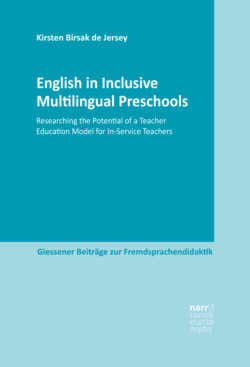Читать книгу English in Inclusive Multilingual Preschools - Kirsten Birsak de Jersey - Страница 30
На сайте Литреса книга снята с продажи.
5.2 Aligning research and teacher education through an approach of participatory action research
ОглавлениеAction research is a well-established approach in language teacher development and offers a synthesis of research and teacher education. It seemed appropriate to meet contextual demands for various reasons (cf. Burns, 2010, p. 11). The approach supports the development of teachers’ competences while it integrates reflective tools that provide research data on the effectiveness of the developmental processes at the same time. It focuses “on issues and questions related to immediate practice and application” (Burns, 2009, p. 114). In my case, the research addresses preschool teachers’ developing English teaching competences in the framework of a teacher education model, which is primarily concerned to accommodate both participating teachers’ individual needs and the demands of their preschool context. Both teachers’ needs and contextual demands have a tremendous influence on teachers’ disposition to introduce English into preschool (→ chapter 3). We know from research in ways language teachers develop that teacher education is “the sum of experiences and activities through which individuals learn to be language teachers” (Freeman, 2001, p. 72). During the process of developing their teaching competences, preschool teachers need to become active and reflective so that they will “think for themselves and reach their own conclusions about their professional practice” (Allwright & Hanks, 2009, p. 141; referring to Giroux 1988). Action research is an approach that supports these processes. A further distinctive feature of the study presented here is that teacher education is based on the idea of teacher development rather than teacher training: while “in teacher training content is generally defined externally and transmitted to the teacher-learner through various processes …, in teacher development the content generally stems from the teacher-learners who generate it from their experience” (Freeman, 2001, p. 76). In this sense, action research is expected to contribute to teachers’ knowledge development through teachers exploring and analysing their own practice in this study. Following the same line of thought, Burns describes action research as empowering the teachers to become ‘agents’ rather than ‘recipients’ of knowledge (Burns, 2009, p. 116).
As has been mentioned in the introduction, action research is considered to be an appropriate tool for teacher development but is equally recognised as an approach for qualitative research in general (Burns, 2007, p. 987). It has been widely used as a qualitative research approach in applied linguistics (Carr & Kemmis, 1986; McTaggart, 1997; Wallace, 1998; Burns, 1999, 2010; Edge, 2000). Qualitative researchers explore contexts of which there is little or no knowledge available yet. Therefore, they need to focus “on understanding the process of what is going on in a setting. … It is exploratory – its purpose is to discover new ideas and insights, or … [to] generate new theories” (Croker 2009, pp. 7-9; italics in original) so that first contextually grounded insights are available for further scrutiny with larger populations. Burns describes the focus of this research approach aptly as follows: “Action researchers are interested in understanding what their explorations reveal, so developing personal practitioner knowledge and ‘practical theories’ is a central focus of this type of research” (Burns, 2009, p. 114). Research practitioners (in this case preschool teachers) need to gain particular understandings that precisely relate to and are suitable for their individual situations – a process that is referred to as Exploratory Practice (Müller-Hartmann and Schocker, 2018a, p. 108; referring to Allwright & Hanks, 2009, pp. 172,173). The preschool teachers first need to gain an understanding of what it means to introduce English into their context (how the children respond to it, for example). At the same time, they need to develop a concept of the teaching processes that are appropriate for their context which involve an approach to teaching languages through tasks (→ chapter 5.8). In the research literature a distinction between action research and exploratory practice (EP) is made, depending on the intention the teacher-researcher pursues with his or her research (Hartman Müller & Schocker, 2018a, p. 108). But two conceptually distinct processes, “taking action for understanding, and taking action for change” are simultaneously involved in practitioner research, with AR focusing on taking action for change and EP focusing more on action for understanding” (Allwright & Hanks, 2009, p. 172; italics in original). The research of this study aligns both concerns: exploratory practice and action research.
After these introductory comments as regards the general research and teacher education approach of the study, the following chapters will describe the features, components and content of the teacher education project. This will be preceded by an illustrating model of the teacher education project, which I have developed to meet the particular demands of the preschool context (→ diagram 4: ‘Preschool English teacher education model through participatory action research’ in the next chapter).
